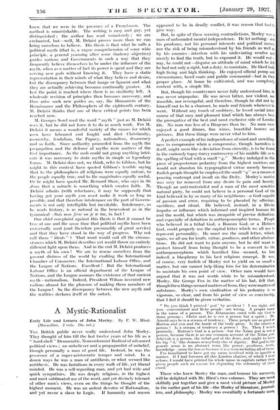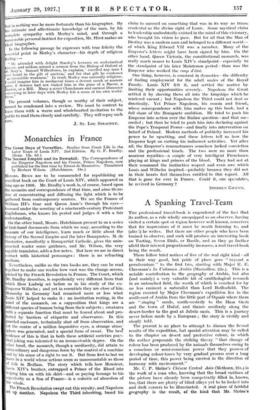A Mystic-Rationalist
Early Life and Letters of John Morley. By F. W. Hirst. (Macmillan. 2 vols. 28s. net.)
Tim British public never really understood John Morley. They thought of him till the last twelve years of his life as a " hard-shell " Democratic, Nonconformist Radical of advanced political views ; an unbeliever and a propagandist of unbelief, though personally a man of good life. Instead, he was the possessor of a super-aristocratic temper and mind. In a dozen ways he was a man of antithesis, or what seemed like antithesis. He was fastidious in every walk of life, yet liberal minded. He was a self-regarding man, and yet had wide and quick sympathies. He was deeply religious, in the highest and most sublimated use of the word, and yet divinely tolerant of other men's views, even on the things lie thought of the highest moment. He was an ardent devotee of Rationalism, and- yet' never a slave to Logic. If humanity and reason
appeared to be in deadly conflict, it was reason that had te give way.
But, in spite of these seeming contradictions, Morley was a man of unbounded mental independence. He let nothing—not his prudence, not his personal interests and political career, nor the risk of being misunderstood by his friends as well as by his enemies—interfere with his undeviating resolve not merely to find the truth, but to expound it. He would not_ nay, he could not—disguise an attitude of mind which he felt he had not only a right, but a duty, to maintain. He liked bon] high living and high thinking. He enjoyed official pomp and circumstance, laced coats and public ceremonial—but in their proper place. At home he cultivated, and was completely content with, a simple life.
But, though his countrymen never fully understood him, la was never unpopular. He was never bitter, nor violent, nor irascible, nor revengeful, and therefore, though he did not In himself out to be a charmer, he made real friends wherever he went. Without any touch of snobbery, he loved social inter. course of that easy and pleasant kind which has always been the prerogative of the best and most exclusive side of London life. No man was less of a Diogenes than he. No man more enjoyed a good dinner, fine wines, beautiful houses and pictures. But these things were never vital to him.
A perfect example of his independence of mind and unwilling. ness to compromise when a compromise, though harmless in itself, might seem like a deviation from sincerity, is to be found in the curiously topsy-turvy controversy of his middle life as to the spelling of God with a small "g." Morley indulged in this piece of preposterous pedantry from the highest motives and would not abandon his typographical virtue merely because foolish people thought he employed the small "g" as a means of pouring contempt and insult on the Deity. Morley's motive was very far removed from any desire to pain and horrify, Though an anti-materialist and a man of the most sensitive natural piety, he could not believe in a personal God of the kind believed in by so many of his neighbours---a God capable of passion and error, requiring to be placated by offerings, sacrifices, and ritual. He believed, instead, in a Divine impulse or influence which informed and inspired human life and the world, but which was incapable of precise definition, and especially of definition in anthropomorphic terms. People who believed in a tribal God, a Roman God, or a Hebres God, could properly use the capital letter which we all use to represent personality. He must use the small letter, which, again, we all use for truth, virtue, goodness, and other abstrac- tions. He did not want to pain anyone, but he did want to protect himself from being thought to be a convert to the anthropomorphism which horrified MI-iv—seemed, to him indeed, a blasphemy to his best religious concept. It was, of course, very foolish of Morley not to yield on so small a matter. but one cannot help liking him for his determination to maintain his own point of view. Other men would have argued that it was not worth while to be misunderstood. Morley, like George Fox in the matter of his hat, felt that, though these things seemed matters of form, they were matters of substance. Morley's own vindication of his pedantry is so vigorous, so clear, and from his point of view so convincing, that I feel it should be given verbatim.
" Do you think I printed ` god' by accident ? I am right, and your conventional and lAehe people—are wrong. A proper name is the name of a person. The Athanasian creed tells me Cod is three persons ; Christ said he is not a person but a spirit
;
Arnold says he is a stream of tendency. These people are as good as Hutton and you and the horde of the truly pious. Is the trinity a person ? Is a stream of tendency a person ? No. Then I weal personify. Hutton's God is a person—hut the Xtian god is not a person, because there is no one common account of the Xtian god. Jehovah is a person, the tribal god of the Jews, and ought to hare his big "J,"like Jeames or anybody else of dignity. But god in the generic sense is an abstract term like power, goodness, truth, knowledge—none the less so because it is a term including all of them. I'm humiliated to have got my name involved with so ignoble a matter. If I had foreseen all this London chatter, of which I heat echoes, I would have printed his whole name in capitals rather than given people such an excuse for degrading the- sok-mnity of their creed."
Those who knew Morley the man, and honour his memory,
will be delighted with Mr. Hirst's two volumes. They are most skilfully put together and give a most vivid picture of Morley in the earlier part of his life—the Morley of literature, journal- ism, and philosophy. 'Model' was essentially= a forttinate man, ut in nothing was he more fortunate than his biographer. By
cis intimate and affectionate knowledge of the man, by .his mplete sympathy with Morley's mind, and through a
colorable personal instinct for exposition, Mr. Hirst makes an deal biographer. In the following passage he expresses with true felicity the .cential point in Morley's character—his depth of religious celing :-
" Ile attended with delight Stanley's lectures on ecclesiastical istorv, and seldom missed a sermon from the Bishop of Oxford at Mary's. Samuel Wilberforce, he explains, excelled any man I ver heard in the gift of unction,' and for that gift he confesses an irresistible weakness.' In truth Morley was naturally religious. could imagine him in mediaeval times a devout monk or austere nor, if Science had not visited him in the guise of a Bacon, a arwin, or a Mill. Many a strict Churchman and earnest Dissenter onversing in later days with Morley felt a sense of his own world- ness."
The present volumes, though so worthy of their subject, nnot be condensed into a review. We must be content to ave them with a warm and wholehearted invitation to the iblic to read them closely and carefully. They will repay such are.
J. ST. LOE STRACHEY.







































 Previous page
Previous page